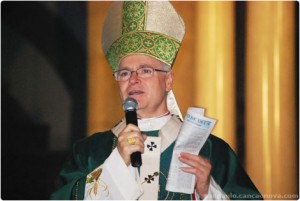 What is the meaning of prayer? Is it important to pray? Is it worth it? How do we pray? These and other questions on prayer are in the center of the Liturgy of the word [recently]. And we could continue to ask, what is the the place of prayer in Christian life? Is it necessary to pray, even with so many things to do. Which is more important prayer or action?
What is the meaning of prayer? Is it important to pray? Is it worth it? How do we pray? These and other questions on prayer are in the center of the Liturgy of the word [recently]. And we could continue to ask, what is the the place of prayer in Christian life? Is it necessary to pray, even with so many things to do. Which is more important prayer or action?
One thing is certain: Jesus prayed as the Gospel attests to us. He passed even entire nights in prayer, alone with God. (cf Lc 6:12) the Apostles also prayed when they waited with Mary mother of Jesus for the coming of the Holy Spirit (cf Acts 1:22); The first Christians, “persevered in prayer” (cf Acts 2:42) many times, St. Paul prayed and recommended prayer to the faithful in his letters. (cf Eph 1:16, Phil 1:4; Romans 12:12; Colossians 4:2) Undeniably, prayer is a part of the Christian life, from the preaching of Jesus and of the Apostles to the beginnings of the Church. It through the long history of the Church prayer is one of the expressions most evident of faith and of the ecclesial life. Christ prayed; and whomever does not prayer, leaves aside an important aspect of Christian life.
Seeing Jesus praying, impressed many of the disciples, so much that they asked Him: “Lord, teach us to pray, as John taught his disciples (Lk 11:11). It was custom that the “teachers” taught prayer to disciples. And thus today, this is part of the mission of whomever should be “teacher in the faith” for his brothers —Priests, pastors of souls, catechists, Here already there are two meanings of prayer: It is in transforming those attitudes that one learns of God and the faith: praying is passing from intellectual believing to relationship with God. In order to know if someone has faith and what type of faith, it is enough to observe one praying and how they are praying. Therefore it is well justified and affirmed lex credendi, lex orandi—the manner of belief appears as the manner of praying and prayer is the expression of what is believed.
There are many modes of prayer and also today there are many teachers of prayer. Are they all equally good? Jesus counseled against the prayer of the hypocrites that was false (cf Mt 6:5) they prayed just with their lips but their hearts were far from God. (cf Mk 7:6) and he asked that people do not pray as the pagans that thought they could convince God with many words (cf Mt 6:7) Instead He taught the Our Father (cf Mt 6:9-15, Lk 11:2-4). The Christian should learn to pray from Jesus whose prayer is “speaking with the Father.”
In our prayer we do not turn to God in an abstract manner, as if God was an energy that can be captured with words or magical rites; in which we invoke an impersonal power with the end to directing it and obtaining the desired benefits… Our prayer is based in the grace received in Baptism, for which we have been chosen by God as sons (“sons in the Son”) and we receive the Holy Spirit, that helps us to pray as we should (cf Rm 8:26-27) As Jesus also, we can direct ourselves to God as sons direct themselves to their father, with all trust, and simplicity. It is beautiful to think that we are not strangers to God, God is not stranger to us, we are of the “family of God”, to whom we direct ourselves with all familiarity. Therefore, our prayer translates itself in profession of faith, adoration, praise, narration of marvels of God, gratitude, suplication, crying out in anquish, request for pardon, intercession for others… Sons love through the father and dedicate to Him a filial love that can find itself in the father’s lap, speaking to him freely, crying on his shoulder feeling his embrace and surrounded by tenderness even without saying a word…
Naturally, I do not have the pretense of saying all on Christian prayer in these small paragraphs… There is still to speak of the beauty and importance of liturgical prayer, when we do not pray alone, but as a community of faith. We unite ourselves to the Priestly Christ that prays with us and for us before the Father. It is priceless prayer, for it is the perfect prayer of the Son and infinite are the merits of His holy incarnation, his life, passion and resurrection. Therefore, the Church recommends with such insistence the participation of the liturgical prayer, especially in Sunday mass.
Cardinal Dom Odilo P. Scherer
Archbishop of Sao Paulo
(The original Portuguese version of this column appeared also in O Sao Paulo, the newspaper of the Archdiocese of Sao Paulo, Brazil.-ed.)
Translated from Portuguese

